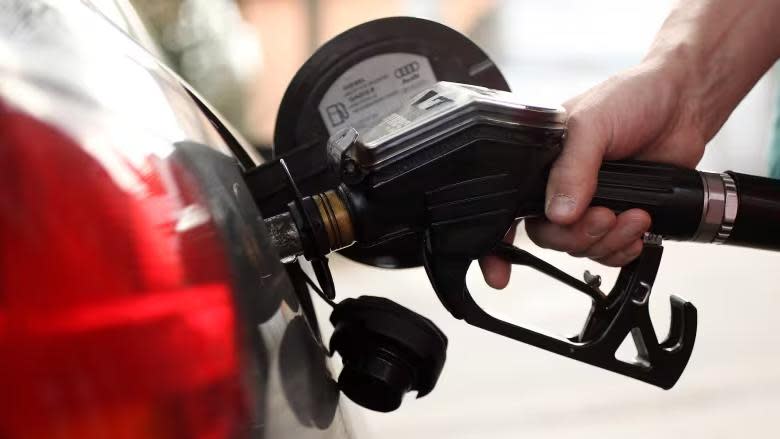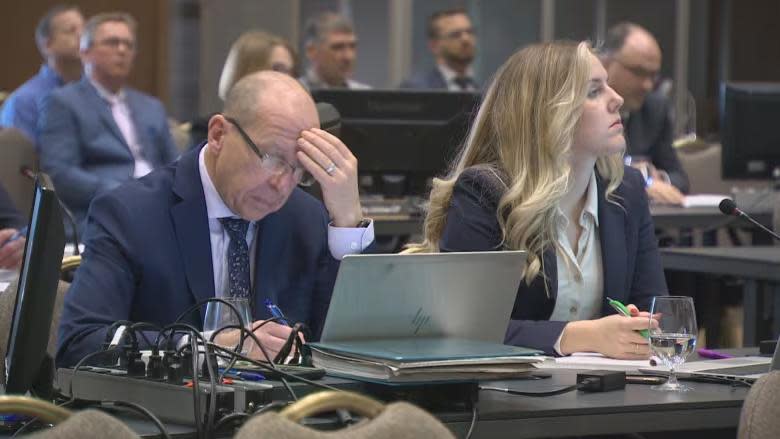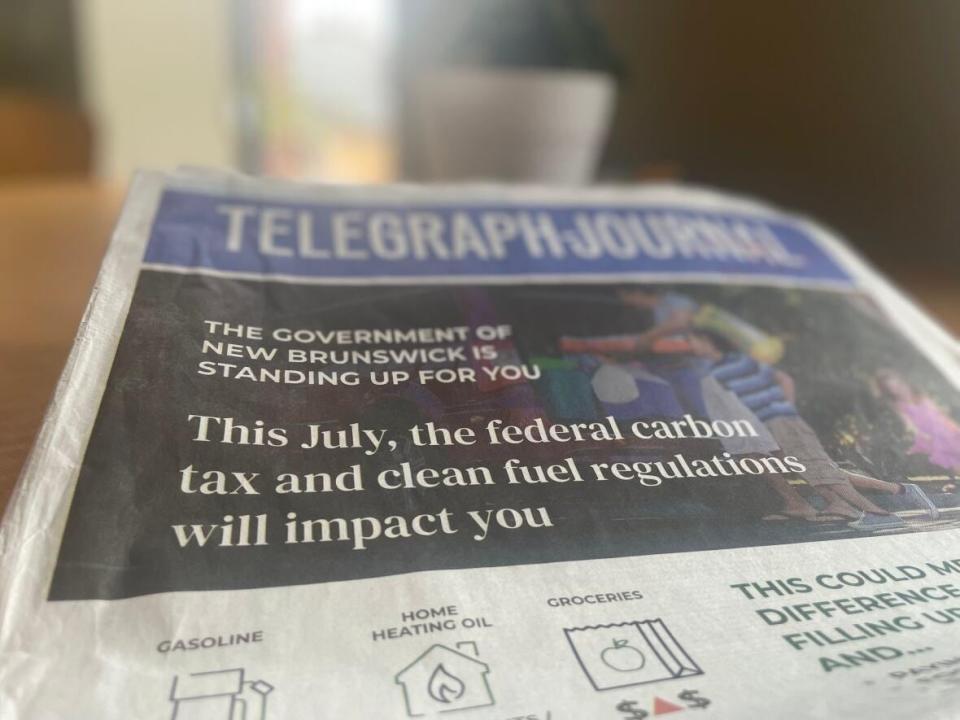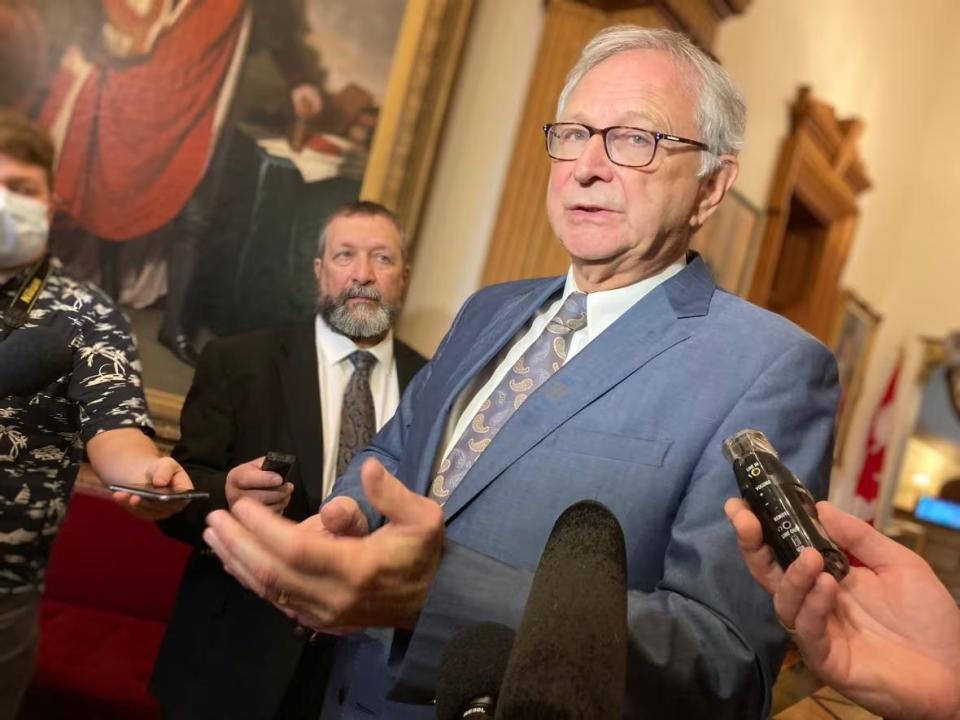Carbon surcharges on fuel to compensate oil companies in N.B. too high, EUB rules

New Brunswick's Energy and Utilities Board is set to lower the amount consumers can be charged to compensate oil companies for federal clean-fuel regulations, following a review of a formula that has been in place for 10 months.
The reduction coming this Friday appears to be in the 10 per cent range. It is not as significant as critics of the formula argued for at hearings last winter but does suggest New Brunswick consumers have been subject to higher charges than necessary since last July.
"The Board orders that the cost of carbon adjustor be adjusted," the energy regulator wrote in a decision it released late last week.
"The new adjustor will be implemented on the regular weekly price setting on May 3rd, 2024."

EUB lawyer Abigail Herrington at a 2023 regulatory hearing. Herrington raised questions in January about whether a formula being used by the EUB might be exaggerating compliance costs facing oil companies from clean fuel regulations. (Jonathan Collicott/CBC News)
New Brunswick consumers have been subject to clean fuel charges since July 7 last year.
They are imposed by the province to help oil companies cope with federal clean-fuel rules and have varied between three and seven cents per litre since first being implemented.
Every one-cent charge on gasoline and diesel in New Brunswick adds about $14 million a year in fuel costs to consumers.
Federal clean-fuel rules are separate from carbon charges and are aimed at forcing oil refineries and fuel importers to lower the "carbon intensity" of the products they sell and the methods they use to refine them.
This week, New Brunswick is allowing an additional 3.39 cents per litre to be charged for gasoline (plus HST) and 3.78 cents for diesel to pay for the estimated cost of the federal clean-fuel rules.
The amounts are set by a formula adopted by the Energy and Utilities Board and calculated weekly.
The formula mostly quantifies the hypothetical cost of what meeting the clean-fuel regulations would be if oil companies imported plant-based "renewable diesel" into New Brunswick to meet the requirements.

The New Brunswick government has worked hard to blame the federal government for clean-fuel charges imposed on New Brunswick consumers. It took out a two-page ad in the Telegraph-Journal last summer to help make that point. (Robert Jones/CBC)
However, in a review of that formula last winter the board heard evidence that renewable diesel has a lower carbon content than it had been assuming in its calculations and this was causing charges to consumers to be inflated.
Under questioning by EUB lawyer Abigail Herrington at a hearing in January, the originator of the board's formula, consultant Angie Brown of the firm Grant Thornton, said she had adopted a "default" value she believed was endorsed by the federal government for how much carbon is contained in renewable diesel.
She acknowledged that if actual carbon values were lower than the default amount, then costs calculated by her formula would fall.

Although Premier Blaine Higgs blames Ottawa for clean-fuel charges in New Brunswick, he is blamed by opposition leaders for passing legislation requiring consumers, rather than oil companies, to pay for the federal policy. (Jacques Poitras/CBC)
"It would be a benefit," Brown said.
"If the carbon intensity in an actual product is less than the default, then yes, you've already achieved some of the compliance through the reduced carbon intensity of that fuel product."
In its decision, the board said it accepted evidence that the carbon content of renewable diesel is lower than it has been using to set charges on consumers. The board said it "will adjust the interim CCA (carbon cost adjester) formula accordingly," beginning this Friday.
However, the board rejected other arguments that its formula also exaggerates the carbon content of New Brunswick gasoline and charges should be reduced further.
Ethanol currently being blended into gasoline sold in New Brunswick helps to lower its carbon intensity but is not counted in the board's formula.
In its decision, the board ruled more data is needed to understand that issue better. It proposed to conduct another review of the clean-fuel charges later this year.


